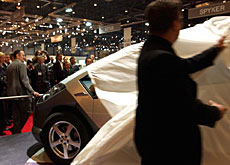Enthusiasts flock to car show despite downturn

The 73rd Geneva International Motor Show opened on Thursday amid the usual glamour and even more hype about the latest automotive technologies.
But behind the bright lights and sleek bodies the industry is battling to cope with falling sales and the threat of a deeper downturn if war breaks out in Iraq.
Opening the event at Geneva’s Palexpo, Swiss president Pascal Couchepin said he hoped that people buying new cars would take environmental issues into consideration.
“Is it an illusion to think that in doing so we can limit the need for state intervention to protect the environment?” Couchepin asked.
Around 700,000 visitors are expected to come to the exhibition, which has also attracted all the major car manufacturers. The fact that Switzerland has no automobile industry of its own means there’s no domestic competition and Switzerland is seen as ideal neutral territory.
Falling sales
Manufacturers hope to whet the appetite of car fanatics despite the current gloomy economic climate.
Car sales have stagnated across the globe and there is widespread concern that a possible war in Iraq would cause a sharper downturn.
In Switzerland, for example, new car sales dropped seven per cent in 2002. Meanwhile, in the United States, sales of new cars and lorries in February fell 19 per cent from the previous year to 331,167.
Encouraging signs
But the show’s organisers are confident that fears over future car sales will not dampen the atmosphere or limit the range of novelties on display.
Spokesman René Lambelet says the number of innovations at the show is an indication of a continuing upbeat mood among car manufacturers.
“The fact that most of the exhibitors have premières at the show means they are quite optimistic,” Lambelet told swissinfo. “And, normally, if the exhibitors are optimistic, the visitors are numerous.”
Even if the economy continues its downward trend for the time being, manufacturers are not likely to stop investing in new technology, says Tony Wohlgensinger, the president of the Swiss Car Importers Association
“It takes them between three and four years to make something totally new,” Wohlgensinger told swissinfo. “So if you stop for a year, you lose the opportunity to be ready when the economy picks up again.”
Luxury and high performance cars, always a crowd-puller at the show, have managed to buck the downward trend so far. They have maintained particularly healthy sales in Switzerland.
Porsche, for example, saw its sales rise in Switzerland by 8.7 per cent between 2001 and 2002, with 1,200 vehicles sold. With prices reaching SFr150,000 for certain models, the manufacturer witnessed its best year since 1996.
Eco-friendly
Despite the need to boost sales, car manufacturers are also keen to promote their latest designs for environmentally friendly cars, which currently have little mass-market appeal.
Many of the show’s premières feature new technology used to create a range of cleaner alternatives to the traditional petrol or diesel engine, including cars that run on hydrogen and on natural gas.
Increasing political pressure to reduce fuel emissions and increasing consumer concern over the environment has prompted the surge in eco-friendly models.
The Kyoto Protocol on climate change, in particular, states that carbon dioxide emissions must be cut below 1990 levels by 2010.
Exploring alternatives
Cars running on fuel cell engines are being promoted by a number of manufacturers at the show as one of the most viable eco-friendly solutions.
Fuel cell engines use hydrogen and oxygen to create electricity to power the car and only omit heat and water from their exhausts. But the technology is still new and fuel cell cars are not expected to take off for at least another ten years.
Honda and Toyota are among those promoting the new car at the show.
“The fuel cell car is very expensive to produce, so for the time being it’s more on an experimental basis,” Francois Launaz, the Commercial Director at Honda’s Switzerland branch, told swissinfo.
“But, even if the sales volume will be quite low, we think we have to contribute to developing this kind of low-pollution car.”
Showcase models
Honda and Toyota are also showcasing a hybrid car, which runs on two engines, one electrical and one petrol.
The hybrid is cheaper to manufacture than the fuel cell car but is still a fuel-efficient alternative to the petrol engine. Its model consumes only 5.1 litres of petrol every 100 kilometres.
Other manufacturers displaying low pollution cars include Ford, whose Model U car runs on hydrogen, and Fiat, which is showcasing its latest diesel car that includes filters to reduce harmful emissions.
Among the other innovations at the show are sophisticated onboard computers, the latest blue tooth technology, breaks controlled solely by electrical commands and automatic speed regulating devices.
swissinfo, Joanne Shields
Around 700,000 visitors are expected to come to the exhibition, which is held in Geneva’s Palexpo.
Manufacturers are especially promoting their luxury cars, which have so far bucked the downturn in car sales.
Numerous models of eco-friendly cars, which currently have little mass-market appeal, will also go on show.

In compliance with the JTI standards
More: SWI swissinfo.ch certified by the Journalism Trust Initiative









You can find an overview of ongoing debates with our journalists here . Please join us!
If you want to start a conversation about a topic raised in this article or want to report factual errors, email us at english@swissinfo.ch.